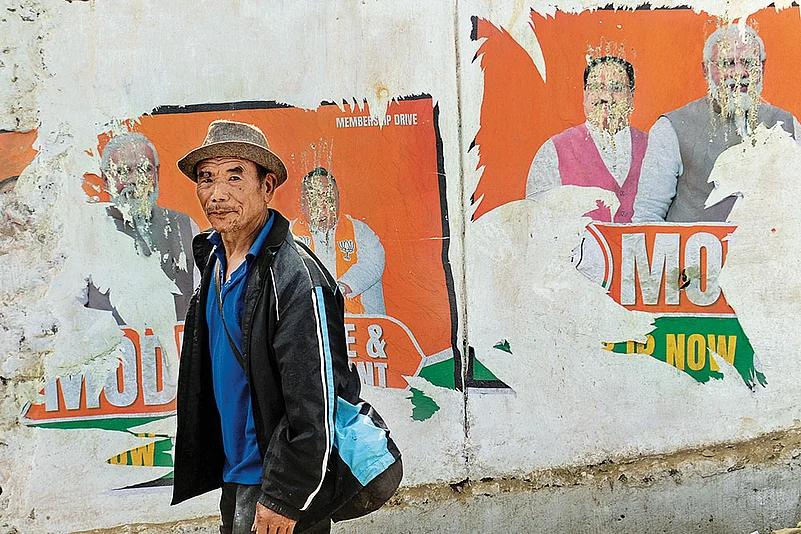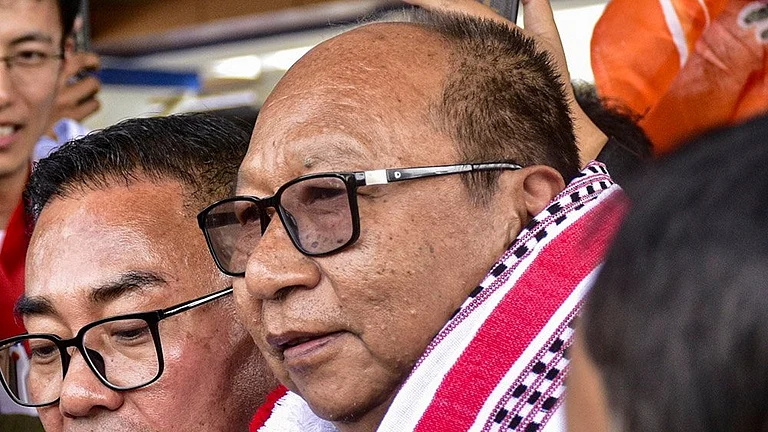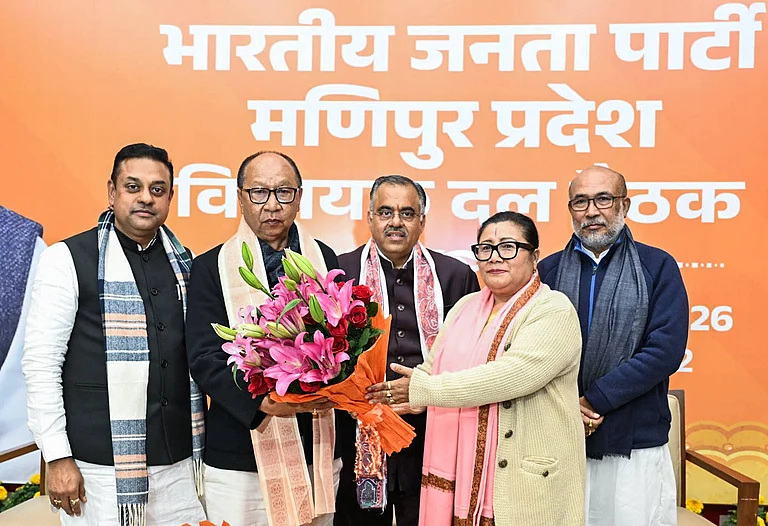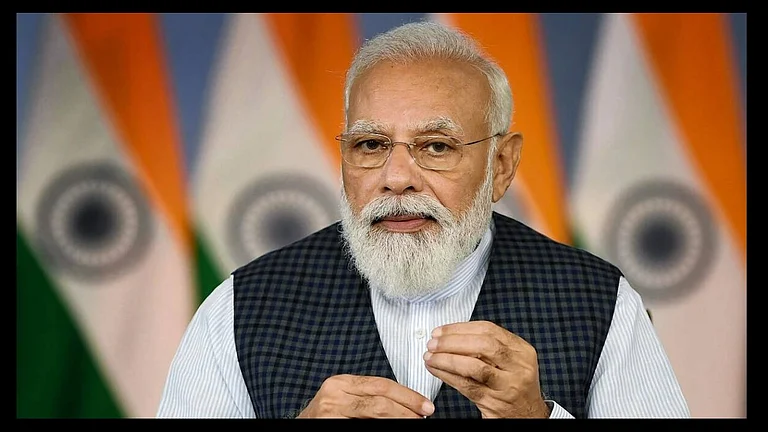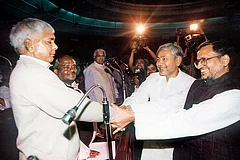The Northeast was not easy ground for the Bharatiya Janata Party (BJP) to enter without allying with the local forces, be it the National People’s Party (NPP) in Meghalaya, the Naga People’s Front (NPF) and the Nationalist Democratic Progressive Party (NDPP) in Nagaland, or the Asom Gana Parishad (AGP) and the United People’s Party Liberal (UPPL) in Assam. The alliances have managed to rule for a decade now, which has been seemingly unwavering. But the outcomes of the 2024 Lok Sabha election in the region has put a brake on BJP’s easy flow, posing challenges to the local allies as well at least in Meghalaya, Nagaland, Manipur and Tripura, while Mizoram went to the Zoram People’s Movement (ZPM), the independent regional force that emerged in last year’s assembly election there.
All of these states have their idiosyncratic issues and their own alternatives for which to vote. Notwithstanding, there are also concerns that prevail across the entire region, even where the BJP has registered victories. These concerns surround the Citizenship Amendment Act (CAA), the Uniform Civil Code (UCC), religious freedom, ethnic identity, ILP (Inner Land Permit), etc.
Meghalaya: BJP Ally NPP Trounced
On the first day of the budget session of the newly formed Conrad Sangma-led coalition government (in 2023) Voice of the People Party (VPP) leader and Nongkrem MLA Ardent Miller Basaiawmoit staged a walk-out protesting against the delivery of the inaugural speech in Hindi by Phagu Chauhan, the governor of Meghalaya.
Formed as recently as in 2021, the VPP has emerged as the primary Opposition party in Meghalaya, which has four MLAs in the Meghalaya assembly for the first time. While other regional parties in Meghalaya—barring the NPP, had chosen to stand with the government—the VPP stood against it consistently.
The VPP’s victory in the Shillong seat with a commendable margin reflects the aspiration of people for change. So is the emergence of another regional force in the offing in Meghalaya? This is an important question because the Congress incumbent MP Vincent Pala suffered a heavy loss. And so did Ampareen Lyngdoh (a cabinet minister from Meghalaya) of the NPP to Ricky Andrew J Syngkon of the VPP. Meghalaya was one of the Northeastern states where protests against the UCC and the CAA intensified last year. Alongside, Ardent has been quite vocal for the ILP for Meghalaya. Surely, regional sentiments and local issues are important here.
Patricia Mukhim, Editor of The Shillong Times says, “The mandate shows that people disliked the NPP as it is a part of the BJP. People remain apprehensive here about the BJP’s agendas, be it the UCC or the CAA, which are not acceptable for them.” She adds, “It’s too early to say how far the VPP will travel. I think they should have gone with the united Opposition bloc.”
All the northeastern states have their idiosyncratic issues and their own alternatives for which to vote. there are also concerns that prevail across the entire region.
Ardent, on other hand, affirms that the VPP will stick to its ground. “From the beginning of statehood, people of Meghalaya have been regional-minded. However, failure of regional parties led them to support national parties. We stand against the UCC and the CAA, but our main focus has been on corruption, poverty and unemployment in Meghalaya. It’s a combination of regional and basic issues that got us the mandate.”
Alankar Kaushik, a faculty member of EFL University, Shillong is of the opinion that the rise of the VPP signifies the emergence of ‘‘native’’ perspectives, characterised by their distinct cultural, societal, and linguistic identity. “However, it’s noteworthy that the broader political verdict in Northeast India seems to downplay the impact of the ruling government,” he says.
Notably, the Tura seat has been snatched away from P A Sangma’s family (which held on to it for the past 45 years since 1977; with a gap of two years from 1989 to 1991). Incumbent MP Agatha Sangma was defeated by Saleng Sangma of the Congress. Agatha Sangma’s absence in the public sphere, her support for the CAA and association with the BJP led to the result. “There is no institution of national eminence in the Garo Hills, which Agatha should have tried for,” says Mukhim.
However, the VPP’s fragility can be traced to its stand on the 1972 Meghalaya reservation policy for jobs. Ardent has been demanding a review of the process, which makes the people of the Garo hills apprehensive. But Ardent told Outlook that he believes the Garo people will come to understand the gravity of the issue.
A Congress Comeback in Nagaland After 20 Years
A few years back, Nagaland was in focus nationally and internationally when the BJP government at the Centre initiated the Naga Peace Accord under Narendra Modi’s leadership. However, the latest Lok Sabha election result indicates that the people there are in no mood to accept it as the ultimate solution.
The many upheavals Nagaland has been experiencing recently, combined with apprehensions about the BJP’s policies nationwide, culminated in the Congress’ stunning comeback in 20 years with Supongmeren Jamir beating the NDPP candidate Chumben Murry by over 50,000 votes. The NDPP is a partner of the National Democratic Alliance (NDA) and heads the Nagaland government.
Apprehensions about religious freedom, a perceived risk to ethnic identity and mishandling of local issues like separate statehood for eastern Nagaland by the governments, both at the Centre and the state, led to this result.

Moa Jamir, a journalist with The Morung Express, a leading newspaper of Nagaland, says the political situation in the State indicated a close fight this time. “From the vantage point of Nagaland, religious freedom and constitutional safeguards for ethnic identities have been the most important issues. While the Central and State governments failed to convince people on these, the Congress candidate could capitalise on them better,” he points out. “The CAA, the UCC and separate statehood demand were the pertinent issues in Nagaland,” he adds.
The Eastern Nagaland People’s Organisation (ENPO) has been demanding separate statehood comprising six districts of present day Nagaland—Mon, Teunsang, kiphire, Shamator, Longleng and Noklak. Formed in 1997, the ENPO has been spearheading the movement for ‘‘Frontier Nagaland’’ since 2010, the year when they submitted a memorandum to the then PM of India. The ENPO decided not to take part in the election and 20 amongst the 60 assembly seats boycotted this election. However, as Jamir says, even without the poll boycott by eastern Nagaland, the verdict wouldn’t have been drastically different.
The Promise of Separate Statehood
In 2012, the erstwhile BJP president Nitin Gadkari had asserted that a separate state of Frontier Nagaland would be carved out if the BJP wins the Lok Sabha election in 2014. However, it remained a distant dream for the people. Home Minister Amit Shah’s reassurance in 2023 of finding a solution to the issue also could not convince them.
The ENPO remains determined to not be satisfied with hefty economic packages in place of the separate state. Supongmeren Jamir has reiterated that the Congress will work to find a solution. He remained firm on his position throughout his campaign.
Manipur Bids a Cantankerous Farewell to the BJP
Manipur’s violent ethnic clashes have not faded away from collective memory and they won’t vanish so easily, at least for the people of Manipur. In the words of Deban Bachaspatimayum, a civil rights activist of Manipur, “One can’t imagine what an ethnic clash is. It is driven by the strongest feelings of belongingness to protect the people and the land. People go to extremes to save their own and the land.”
The Lok Sabha election results reflect the anger of the people against both the Central and State governments. However, the BJP did try to win the election there—it supported the NPF candidate in the Outer Manipur seat (comprising mainly the hills) while fielding its own in Inner Manipur (comprising the valley). There were apprehensions about the Outer seat where all the candidates are Nagas including that of the Congress. The division of votes, involvement of underground arms groups of both the Kukis and the Nagas, the influence of the The National Socialist Council of Nagaland NSCN (IM)—all played a part in the polls.
The Kukis decided not to field any candidate. Although the narrative of election boycott by the Kukis was in the air initially, the Kuki Inpi Manipur (KIM)—the apex body of the Kukis—appealed to people to exercise voting rights. A former MP from Outer Manipur, Kim Gangte, told Outlook that in the conflict-laden state, both the Kuki and Meitei communities blamed the BJP to the core and that is why they have voted for the Congress in both the Inner and Outer constituencies of Manipur. “Both the Kukis and the Meiteis must have finally realised that it was the Centre and the State governments that caused the people all the misery, pain and death that they face till today. This is a signal given to the governments by the people out of their anger and pain,” she says.
Could TIPRA Motha with INDIA Bloc Bring Different Results in Tripura?
The TIPRA Motha Party (TMP) emerged in Tripura politics as a prominent presence during the 2023 assembly election in which it bagged 13 seats. Based on the identity issue of the Tiprasa people, the TMP opposed the CAA vehemently as well as the BJP. But this year, they aligned with the BJP just before the Lok Sabha polls. The BJP won both the West and East Tripura seats.
However, there is growing disenchantment within the TMP and its supporters. This was reflected in the election results where the vote percentage of the BJP-TMP alliance decreased in comparison to the previous election.
This year’s election result is a silver lining with the strong message that diversity in India is to be honoured and local issues should be solved from a local perspective only.
TMP leader Pradyot Bikram Manikya Debbarma brought in his sister Kriti Devi Debbarman to contest from the East Tripura seat, where the Tripuri tribals are a deciding factor. Kriti Devi fought under the BJP’s symbol. This irked many TMP supporters. Bikash Rai Debbarma, a political observer and linguist-activist from Tripura told Outlook, “Kriti Devi doesn’t have any rooting in Tripura’s politics. Her husband was also a BJP MLA. She was not a member of the TMP and Pradyot made it a sentimental issue.”
Bikash Rai Debbarma said that had the TMP allied with the INDIA bloc, the results would have been different. He considers the latest tripartite treaty between the TMP and the Tripura and Central governments just an eyewash. “In the Northeast, we have our own problems of protecting identity and ethnicity and in the name of Indianness, all are diluted,” he says. “But this year’s election result is a silver lining with the strong message that diversity in India is to be honoured and local issues should be solved from a local perspective only.”
BJP Does Well in Assam, Arunachal and Sikkim, but All is Not Well
The BJP’s undisputed victories in the Northeast came from Arunachal and Assam, while in Sikkim, the NDA ally outperformed. However, Assam gave slightly more votes to the Congress than the BJP even though the latter could manage only three seats out of a total of 14. The Congress vote share is 37.48% while the BJP got 37.43 % of the votes polled. Moreover, there are certain signals in Assam that reflect peoples’ growing disenchantment of the BJP.
Gaurav Gogoi’s win in the Jorhat seat is a sharp retort to the Assam CM’s claim. Observers in Assam say that CM Himanta Biswa Sarma made the fight in Jorhat a personal one as he repeatedly said that Gogoi would lose with a huge margin. Moreover, many ministers close to the CM were actively engaged in the Jorhat contest. Gogoi’s victory is widely seen as a moral defeat for the CM.
All India United Democratic Front (AIUDF) supremo Badaruddin Ajmal lost the election from Dhubri with a margin of over ten lakh votes to Rakibul Hussain of the Congress. The INDIA bloc candidate in Dibrugarh, Lurinjyoti Gogoi, bagged over four lakh votes while contesting against Union minister and ex-CM of Assam Sarbananda Sonowal, and Mira Borthakur of the Congress in Guwahati bagged over six lakh votes while contesting against the BJP’s Bijuli Kalita Medhi. Although both lost to the BJP, the anti-BJP vote share in both constituencies increased significantly.
However, the Opposition could have done better if seats were managed better, at least in the Barpeta and Diphu seats, where the split in Opposition votes helped the BJP win. In Barpeta both the Congress and the Communist Party of India Marxist (CIP[M]) fielded candidates, while in Diphu, an alliance between the Congress and independent candidate John Ingti Kathar would have brought different results. A similar situation prevailed in Kokrajhar and Darrang-Udalguri, where the Bodoland People’s Front (BPF)—a former Congress ally, and the Congress fielded candidates.
(Views expressed are personal)
(This appeared in the print as 'Winds Of Change')
MORE FROM THIS ISSUE
Sandipan Talukdar is an independent journalist based in Guwahati






